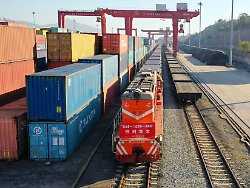Partnership “without borders”
Russian economy turns to China
03/23/2022, 08:31 am
China and Russia have been expanding their economic relations for years. The war in Ukraine and the Western sanctions against Moscow are apparently leading to a further rapprochement between the two countries. China in particular is benefiting from Russia’s isolation from the world market.
Marat’s phone rings frequently these days. The Shanghai-based Russian gets a lot of calls from companies looking for remaining business and supply chain partners because of Western economic sanctions against Russia. “I have a lot of extra work to do, but of course more profits,” says the 42-year-old, who prefers only to reveal his first name.
Because the situation in China is also delicate when it comes to the Russian war of aggression in Ukraine. The People’s Republic is a long-standing ally of Russia. While the West isolated Russia politically and economically after invading the neighboring country, cutting it off from the financial markets and sending the ruble plummeting and the country to the brink of insolvency, China refuses to call what is happening in Ukraine an “invasion”.
This leaves crucial channels open for trading partners and China could expand its importance as a sales market and supplier in equal measure. Marat, for example, was contacted by a company from Belarus that manufactures electronic components and is now cut off from its suppliers in Europe and North America because of the sanctions – because Belarus is an ally with Russia. “They told me: ‘Be ready,'” says the Russian entrepreneur.
More trade since the war
China is Russia’s most important trading partner: Last year, according to Chinese customs, trade volume was $147 billion (about 133 billion euros), more than 30 percent more than in 2019. There are also signs of an upturn in economic activity since the beginning of the war.
“This crisis is an opportunity for Russian companies in China,” says another Russian entrepreneur working in Beijing. He wishes to remain anonymous and chooses the name Vladimir. “China is open. They say: ‘If you want to buy something, we have it.'” He specializes in importing Russian specialties to China.
Sanctions cause problems
However, the past few weeks have been tough for all companies in China with connections to the Russian market. Regardless of whether it is a business with pesticides, car parts or accessories for pets – because of the strongly fluctuating ruble value, Russian customers preferred to refrain from ordering for the time being. The exclusion of Russian banks from the Swift system also caused massive problems in paying the bills.
Another problem: deliveries were delayed because carriers refused to process Russia-related shipments and also blocked important routes to the world’s largest country. “Everyone is waiting for something that is more predictable,” says entrepreneur Vladimir in Beijing. “Everyone thinks the sanctions could be lifted if the war ends soon.”
Friendship between Moscow and Beijing is getting closer
In recent years, China and Russia have steadily expanded their diplomatic and economic partnership – above all in order to counter the United States together. Russian President Vladimir Putin personally traveled to Beijing last month for the opening of the Winter Olympics. He and his Chinese colleague Xi Jinping announced a partnership “without borders” and sealed billions of dollars in oil and gas deals.
In Shanghai, Marat believes that the war and the sanctions are likely to affect the various sectors of the economy to varying degrees. Large industries such as chemicals could do better than the consumer goods sector. Chinese CEOs also expect the purchasing power of Russians to fall.
Others, on the other hand, see a comfortable situation for China in the long term, since the desperate search of the Russian economy for reliable trading partners is likely to increase – this also applies to Chinese working in Russia. “For China, objectively speaking, it’s a good thing that Russia is subject to Western sanctions,” says Chi Dashui.
The 38-year-old lives in Moscow and works there for a platform that sells Chinese products. According to him, many Chinese companies would be willing to settle in Russia if the local conditions are right. “In the long run, China has more to gain than it has to lose.”
